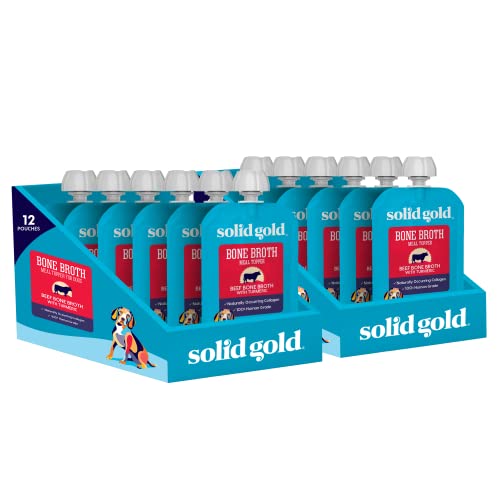Kiwi, also known as kiwifruit or Chinese gooseberry, is an edible berry that’s popular in countries like China, Australia, and New Zealand.
Most kiwis are characterized by thin and fibrous light-brown skin. Although this skin is sour, it’s actually edible as it comes with numerous nutritional benefits for humans.
The flesh of the kiwifruit is usually golden or light-green and features rows of small, black edible seeds. It has a rich, sweet flavor.
Due to their immense nutritional benefits for humans, kiwis have been cited as one of the superfoods. However, can dogs eat kiwi?
The short answer is yes; your furry friend can have kiwi. But as we shall find out, you need to offer the fruit only in small portions.
The most important thing to remember is that dogs primarily rely on a diet of meat. Therefore, anything that’s not flesh should be offered to them only in moderate amounts.
What Are The Nutritional Benefits Of Kiwifruit?
Even before we can answer the question ‘’is it safe for dogs to eat kiwi?’’, we should first understand the nutritional value of this fruit.
You should also remember that not all health benefits of the kiwifruit apply to dogs.
For instance, the kiwifruit is sweet and tangy to humans; hence can be used as an appetite booster. However, dogs might find the taste a little uncomfortable.
Dogs have 1,706 taste buds, compared to the 9,000 in humans. That makes a dog’s palate up to six times inferior to humans’. But apart from taste, most of the health benefits of kiwifruit apply to both man and dog.
The following are some of these benefits;
1. Aids Digestion
Like humans, dogs also experience digestive complications such as constipation and incontinence.
Luckily, kiwi has an abundance of insoluble fiber that can efficiently help relive such digestive issues. Their abundance in the actinidin enzyme particularly helps with the breakdown of protein.
So, the next time your dog suffers from constipation or bowel incontinence, do not rush to the vet. Instead, offer the dog some kiwifruit and observe how it responds to the remedy.
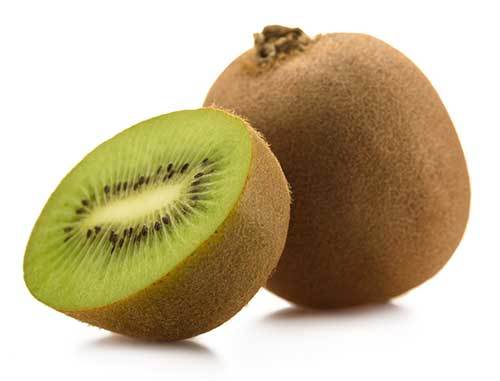
2. Boosts Immunity
Kiwi is a rich source of vitamin C. One cup contains up to 273% of the recommended daily intake of vitamin C.
Therefore, offering kiwi occasionally to your dog could go a long way in keeping diseases at bay. That’s especially true for the most vulnerable groups, such as the very young, the very old and dogs recovering from a debilitating illness.
Further studies on the immune-boosting abilities of kiwi suggest that the fruit could be very resourceful in fighting flu-like diseases. Examples include the common cold and asthma.
3. Lowers Risks of Cancer
Kiwifruit has also been cited as one of the most popular cancer-fighting foods. The fruit reduces the possibility of oxidative stress.
As you may already know, oxidative stress leads to DNA damage. As a result, the victim may experience a host of health conditions, especially chronic and terminal illnesses like cancer.
Colon cancer is a notorious consequence of oxidative stress. But by regularly adding kiwi to your canine’s diet, you significantly help lower the risks of developing malignant cells.
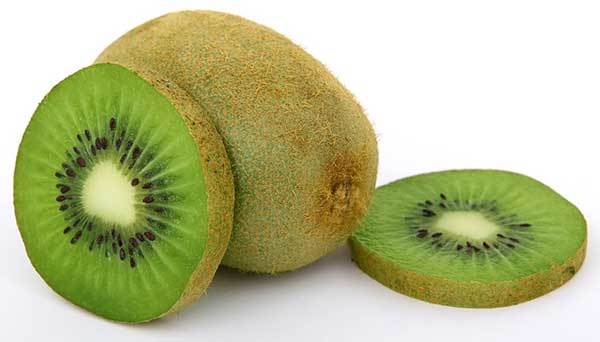
4. Management of Blood Pressure
Like humans, pets also suffer from spikes in blood pressure. There are no known causes of primary hypertension in dogs.
However, there are numerous factors that lead to secondary hypertension. Some of these include hyperthyroidism, hormonal imbalance, Cushing’s disease, adrenal tumor, and diabetes mellitus.
So, you could be wondering, can diabetic dogs eat kiwi? Yes, a diabetic dog can immensely benefit from kiwifruit.
According to this 2014 research, kiwi contains bioactive substances that help keep blood pressure within normal levels. These substances primarily work by reducing the risk factors for hypertension, such as heart attacks and strokes.
Additionally, kiwifruit is excellent at reducing blood clotting. Even better, it lowers the amount of fat in blood. Along with regulating blood pressure, decreasing the content of lipids in blood generally enhances the health of your dog’s heart.
5. Prevents Vision Loss
Another notable benefit of kiwifruit is the prevention of macular degeneration. Kiwi contains powerful antioxidants such as lutein and zeaxanthin, which prevents retinal oxidative stress.
Studies have revealed that three servings of kiwi every day can lower the risks of macular degeneration in humans by up to 36%.
Dogs suffer from various forms of vision failure. Some may be genetic, but most result from Progressive Retinal Atrophy. By carefully administering kiwifruit to your furry friend, you can help him keep these diseases at bay.
- 10 Benefits in 1 Daily Chew – Our 10 in1 Multivitamin chews combine a well-rounded blend of essential vitamins and supplements for dogs’ overall daily…
- Joint Health with Glucosamine – These soft chews have high amounts of glucosamine and other joint support ingredients that may help reduce joint…
- Help Improve Digestion and Skin – Our chews contain 1 Billion CFU probiotics and pumpkin, which help keep your dog’s digestive system and digestive…
Last update on 2025-01-08 / Affiliate links / Images from Amazon Product Advertising API
6. Great with Dehydration
A 100-gram serving of kiwifruit contains up to 83% water, and that’s an excellent remedy for dehydration. It’s tough dealing with a dehydrated dog, especially if the dog simply won’t drink water.
A dog may be dehydrated, refuse to drink but still be able to eat. In such cases, the best approach would be to offer them foods high in water content. And a great option here is the kiwifruit.
With this fruit, your dog not only benefits from the high water content. He also enjoys the many mineral elements that come with the fruit.
But you should understand that like any fruit, there are dried and succulent kiwis. So, are they all recommended for a dehydrated dog?
Can dogs eat dehydrated kiwi? As your primary objective is to rehydrate the dog, it beats logic to offer dehydrated kiwi to your dog.
7. Skin Nourishing Benefits
The last benefit of kiwi fruit is its skin-rejuvenating effects. This mainly applies to kiwi seeds. The seeds are laden with omega-3 fatty acids.
Like us, dogs are unable to produce Omega-3 fatty acids on their own. Therefore, they exclusively rely on the foods we serve them.
Omega-3 nourishes your dog’s coat by reducing dander and skin dryness. It also prevents inflammation that results from various forms of allergens such as flea bites, inhalants, and certain foods.
But are these the only benefits of kiwi for your dog? Not at all. Kiwifruit features lots of other nutritional elements.
Remember that most of the studies on the nutritional value and health benefits of kiwi have only been conducted on humans. However, we can always tie them to dogs since our immune systems work in nearly the same manner.
Are Kiwis Safe For Dogs?
We’ve already looked at the numerous benefits of kiwifruit. But are they completely safe for dogs?
Generally, fruits and vegetables should comprise only 10% of your dog’s daily nutrition. You can increase the portion a little if you’re serving the fruit as a health remedy.
Usually, there’s a fine line between safe and unsafe proportions. Therefore, you’re generally advised to consult your vet before offering kiwi to your pooch.

What Part of Kiwi Is Best For Dogs?
Like most fruits, kiwi is made up of the skin, flesh, and seeds. But which part should you feed your dog? Can dogs eat kiwi skin? What about the pulp and seeds?
In humans, all the three components are considered safe. But the same cannot be said for dogs. First, you should never offer the skin of the kiwifruit to your dog. Though it’s edible and most dogs actually love it, the skin carries potentially toxic substances.
Depending on how the fruit was cultivated, there may be lots of aerosol residues on the kiwi skin. If ingested, these could cause gastrointestinal issues.
The outer layer also harbors pathogens such as salmonella. Washing may not always help in getting rid of these toxic bacteria.
Needless to mention, the skin’s mere hardness could be a choking hazard for your canine. In addition to the outside layer, experts also discourage offering kiwi seeds to your dog. Dogs do not take time to chew their foods. Instead, they goggle it whole.
So, kiwi seeds present even higher choking risks to your furry companion. Are you still asking yourself – are kiwis bad for dogs?
Evidently, it depends on how we serve the fruit. Always insist on kiwi flesh and avoid serving your dog kiwi skin or seeds.
- Works as a dog food topper – For pet parents looking for an alternative to capsules, raw treats, or soft chews, all it takes is a few pumps of Salmon…
- A tasty & body nourishing treat for cats & dogs – Essential fatty acids for a healthy coat.
- Powerful Omega Fatty Acids – This premium fish oil liquid formula is loaded with the healthy Omega-3 fatty acid (with epa and dha) to support health…
Last update on 2025-01-15 / Affiliate links / Images from Amazon Product Advertising API
What Form Of Kiwi Should You Serve Your Dog?
We’ve already seen that the best part of kiwi to offer your dog is the flesh. But in what form?
First, you can offer raw kiwi to your dog. You might also make the fruit into juice and provide it to the dog, either as a standalone food or in addition to its regular diet of meat.
Your best bet is to offer raw, solid kiwi to your pooch. That way, it’s easier for the dog to savor the fruit and pick up its taste.
If you don’t have the time to head down to the grocery for a fresh piece of kiwifruit, you can buy canned kiwi. However, can dogs eat canned kiwi?
Yes, dogs generally enjoy canned foods, and kiwi is no exception. One significant advantage of canned food is that it comes with additional water content. However, when feeding your dog canned kiwi, ensure the fruit isn’t past its sell-by date.
Above all, there shouldn’t be any additives such as artificial flavors, salt or spices. A dog’s digestive system isn’t developed to break down spices and condiments. Consumption of these can only lead to an upset stomach.
Even worse, canned kiwi contains high sugar content, another potentially hazardous food for dogs. High sugar content might cause tooth decay as well as contribute to weight gain.
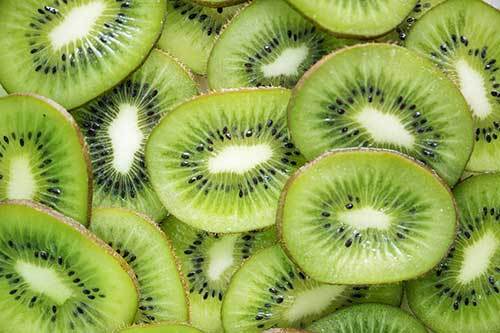
Apart from canning, refrigeration, or freezing, is another basic method of preserving kiwi. But can dogs eat frozen kiwi?
That pretty much comes down to the prevailing temperature conditions. According to anecdotal evidence, dogs prefer warmer foods to colder ones. So, unless you have other valid reasons for offering frozen kiwi to your dog, you may want to warm it up a bit.
How Much Kiwi Can Dogs Have?
This is a relative question, as the answer depends on a few factors. First, are you offering the fruit to your dog as a nutritional supplement or a health remedy?
If offering it as a dietary supplement, begin with tiny portions, perhaps ¼ of the fruit for the first time. Watch out for any adverse reactions before increasing your portions.
With time, you can increase the portions depending on the size and age of the dog. However, you should generally offer kiwi as an occasional treat and not as a substitute for your dog’s staple diet. And whenever you do, don’t exceed two slices of the fruit.
- ADVANCED DOG PROBIOTICS FOR DIGESTIVE HEALTH – Each chew contains 4 billion CFUs of probiotics, specifically formulated for dog digestive support….
- COMPREHENSIVE DOG DIGESTIVE SUPPORT – Our advanced probiotic chews for dogs include a blend of prebiotics and probiotics to support gut health, aid in…
- IMMUNE SYSTEM & GUT HEALTH CONNECTION – With 4 billion CFUs and essential digestive enzymes, our dog gut health probiotics reinforce the gut-immune…
Last update on 2025-01-13 / Affiliate links / Images from Amazon Product Advertising API
How to Serve Kiwi to Your Dog?
Before serving kiwi to your pooch, there are certain precautions to keep in mind. The following are some of them.
1. Keep it fresh:
There are no two ways about this, and the benefits of serving fresh kiwi to your pooch cannot be overstated. Fresh, in this sense, implies three things.
First, the fruit shouldn’t be too ripe. Check that it isn’t too soft or discolored. Secondly, remember we have the fresh, succulent kiwi; and the dried, dehydrated one.
So, can I feed my dog dried kiwi fruit? Apart from being hard to chew, dried kiwi lacks various nutritional elements, including enough water content.
And lastly, wash the fruit properly to remove any dirt and soil particles, aerosol residues and toxic bacteria.
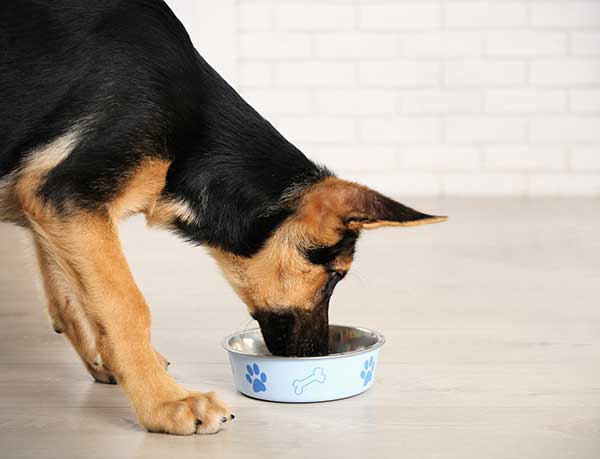
2. Cut the fruit into small pieces:
The only way to prevent your dog from choking on kiwi is to cut the fruit into small, manageable portions.
After removing the outer layer, remove the seeds and then dice the flesh.
3. Go for organic:
If possible, insist on organic kiwi. Organic kiwi contains more nutritional benefits than the regular kiwi in groceries out there. Plus, it’s unlikely laden with preservatives, which makes it a healthier alternative than regular kiwi.
4. Spice things up:
Giving kiwi to your dog can be a challenging or pleasant experience depending on how the dog reacts to the fruit.
If your dog shows aversions, you should get a little more creative. You can blend the fruit and make a chia pudding. You could also serve the fruit as summer fruit salad, along with other fruits considered as safe for dogs.
5. Watch out for allergies:
Kiwi allergies typically result from overconsumption of the fruit. Common allergies include wheezing, soreness of the mouth and muzzle, as well as gastrointestinal issues.
- SUPERFOOD INGREDIENTS – This dog bone broth is crafted with carrots, sweet potatoes, apples, pumpkin, and ginger to help promote gut health and…
- SLOW-SIMMERED BONE BROTH – Your pup will love the rich aroma and taste of this slow-simmered bone broth that promotes healthy hydration and provide…
- NATURALLY OCCURRING COLLAGEN – Rich in natural collagen from beef bones, collagen is an essential protein that promotes healthy skin and nails while…
Last update on 2025-01-13 / Affiliate links / Images from Amazon Product Advertising API
What’s The Worst That Could Happen?
After having looked at the immense benefits of kiwi for dogs, you might still be wondering; is kiwi bad for dogs and if so, can kiwi kill dogs?
Kiwi indeed comes with quite a few side effects. And while there are no documented fatalities, the risks of death are real.
The first possible side effect of kiwi is choking. This commonly results from consuming kiwi skin or the pit. Besides, there are risks of toxicity. Kiwi pit itself is considered toxic. Toxicity could also result from the harmful chemicals or bacteria present on the fruit.
In some instances, your dog might develop an upset stomach. This is usually marked by gastrointestinal symptoms such as diarrhea, vomiting, nausea, and flatulence.
Though fiber is recommended for relieving constipation, kiwi contains an abundance of it, and that may have a laxative effect on your dog.
Another common side effect most pet owners tend to overlook is an addiction. While you want your dog to develop a taste for kiwi, you should also watch out for excess cravings for the fruit.

Conclusion
Finally, is kiwi good for dogs? Yes, the fruit packs many health benefits for dogs. However, it’s not a dog’s staple food. Therefore, you should only offer it as a treat and not as a substitute for meat.
Most importantly, offer the fruit in small portions as you watch the dog’s reaction to it. If the dog doesn’t seem to respond very well, you can consider alternatives such as apples and berries.
Checkout Our Favorite Dog Products
1. BEST PUPPY TOY
We Like: Snuggle Behavior Toy with Heart Beat & Heat Pack – Ideal toy for new puppies.
2. BEST DOG TRAINING PROGRAM
We Like: Doggy Dan The Online Dog Trainer – Stop any dog problem and raise the perfect puppy with The Online Dog Trainer.
3.BEST FOOD FOR DOGS AND PUPPIES
We Like: Victor Super Premium Pet Food – Ideal for growing puppies and pregnant or lactating females. Also provides sustained energy for sporting dogs and dogs with high physical demands.
4. BEST DOG DNA TEST
We Like: Embark Dog DNA Test – Embark screens for over 250 dog breeds + tests for 170+ genetic diseases including MDR1 drug sensitivity, glaucoma, degenerative myelopathy, and dilated cardiomyopathy, some of the most common adult-onset diseases in dogs.





